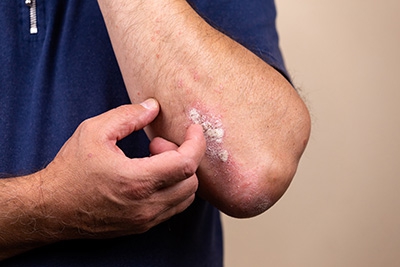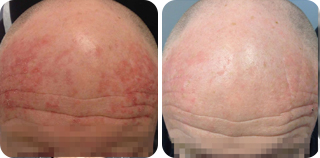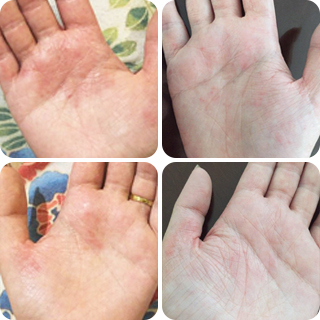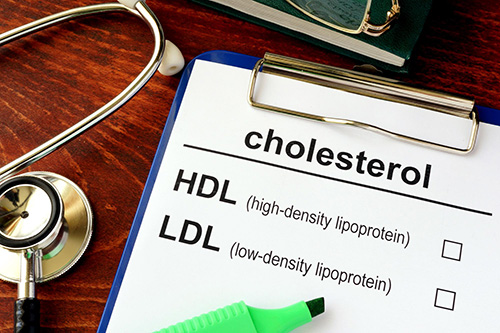What is the cause of eczema and how can we treat it?

The main reason of eczema is the inflammation of the skin cells, which triggers an immune system reaction. Normally, inflammation is a vital part of the body's response to injury or infection.
It is the body's way of signaling the immune system to heal and repair the damaged tissue, as well as defend itself against foreign invaders, such as viruses and bacteria. Without inflammation as a physiological response, wounds would fester, and infections could become deadly.
Now, if the inflammatory process goes on for too long or if the inflammatory response occurs in places where it is not needed, it can become problematic.
Inflammation is the cause of many diseases. If inflammation occurs in the nerve fibers, it causes white blood cells to attack them and leads to Multiple Sclerosis (MS). If the joints become chronically inflamed, it can cause rheumatoid arthritis. The skin inflammation develops eczema.
So, an essential step in treating eczema is to find the root causes of inflammation through blood tests and cure them.
 Mr. B Sh, Aged 55After 2 Months
Mr. B Sh, Aged 55After 2 MonthsThe treatment result of one of our clients; a 55 years old man after two months. He had Eczema, and based on his blood test results, a program was set for regulating the level of minerals and vitamins, cleansing the liver and reducing inflammation in his body.
THE MAIN CAUSES OF INFLAMMATION AND ECZEMA:
1) Free Radicals and Oxidative Stress:
Free radicals are unstable molecules that can damage the cells in your body and cause inflammation and aging. They form when atoms or molecules gain or lose electrons. They often occur as a result of normal metabolic processes. For example, when your body uses oxygen, it creates free radicals as a by-product and the damage caused by those free radicals is called "oxidative stress."
Your metabolism isn't the only culprit. You can also be exposed to free radicals that come from various environmental sources such as radiation, drugs, pesticides, solvents, cigarette smoke, and other pollutants.
Also, an overload of some essential minerals in the body, such as Iron and Copper, increases the production of free radicals and inflammation. The reason is that Iron directly attracts oxygen, and when it contacts delicate body tissues, the singlet oxygen molecules, detach and destroy body tissues and cause inflammation.
Today, due to over-consumption of resources containing Iron and Copper like red meat, eggs, nuts, and multivitamins/minerals supplements, Iron and Copper overload are very common.
Now, your cells contain glutathione, which is a substance made from three amino acids: cysteine, glutamate, and glycine. Glutathione acts as an important antioxidant in your body. That means it helps combat free radicals.
Low glutathione levels make cells vulnerable to free radicals, which increases inflammation in cells. Your body uses amino acids and antioxidants such as Sulfur, beta-carotene, vitamin C, E, Selenium, etc. to produce glutathione and fight free radicals. The deficiency of these nutrients can lead to a decrease in glutathione levels and an increase in free radicals.
It is safe to say that most patients with eczema have vitamin and mineral imbalances, and the levels of glutathione and antioxidants in their bodies are low. To resolve this problem, the levels of vitamins, minerals and inflammation should be checked through blood tests, and based on the results, the appropriate supplements with the right dosage and duration should be selected.
 Ms. M F, Aged 30After 3 Months
Ms. M F, Aged 30After 3 MonthsThe treatment result of one of our clients; a 30 years old woman after three months. She had Eczema, and based on her blood test results, a program was set for regulating the level of minerals and vitamins, cleansing the liver and reducing inflammation in her body.
2) Stress, high levels of cortisol hormone and allergies
Stress increases the level of the Cortisol hormone and causes many biochemical reactions in the body. High levels of Cortisol put the central nervous system (CNS) in alert mode, which can lead to an overactive immune system. An overactive immune system may respond too strongly to something innocuous and cause allergies.
Medical researchers have now shown that an immune system skewed toward allergy, alters the lipids in the skin. The altered lipids allow the skin to crack, water to leave and irritants to enter, setting the stage for eczematous lesions to develop.
On the other hand, stress depletes the body from Zinc and Magnesium, which can increase the inflammation in the skin and worsen eczema. Stress can have a psychological or metabolic origin.
In people with eczema, it is essential to check the level of Cortisol and its ratio to the Dehydroepiandrosterone (DHEA) hormone through a blood test.
3) Lipids and cholesterol levels:

Lipids are skin's natural fats. They are essential components of skin, and play a crucial role in maintaining the strength of the skin's protective barrier, which holds moisture, protects the skin from damage and keeps dirt and impurities out. They also aid the skin's natural repair process. Lipids are generated from two main sources – the epithelial cells and the sebum, which is secreted onto the surface.
To produce enough lipids by skin cells, the level and ratio of good cholesterol (HDL) to bad cholesterol (LDL) must be ideal.
Inappropriate cholesterols ratio causes a decrease in skin lipids and makes the skin vulnerable, easily inflamed, and over time, problems such as skin cellulite, acne, and eczema may develop.
It is important to check your triglyceride levels, good, bad, and total cholesterol through blood tests.
4) The role of omega-3, 6 and 9 unsaturated fatty acids:

Omega-3, omega-6 and omega-9 fatty acids are all important dietary fats. Interestingly, each one has several health benefits for your body. However, it is important to get the right balance of omega-3, 6 and 9 fatty acids in your diet. An imbalance may contribute to a number of chronic diseases such as skin problems and eczema.
The explanations written by patients in the consulting form about their nutrition and the oils they consume help me to recommend the appropriate dose of omega-3, 6 or 9 fatty acids in the treatment plan if needed.
5) Liver problems:

The liver is responsible for purifying the blood from chemicals and toxic metals. Everyday, these substances enter the body in different ways, such as water, air, and food. When the liver is unable to function properly, these substances remain in the body and cause inflammatory reactions.
In other words, when the body is unable to excrete excess substances through the liver and bile, it tries to excrete them through the skin, which can lead to skin problems ranging from acne to eczema.
Many people with eczema have mild to severe liver problems, and they may not be aware of it.
Liver function can be checked through ALT, AST, ALP, Bilirubin blood tests and if needed, herbs such as Dandelion Root, Milk thistle, and amino acids like Alpha-lipoic acid, Methionine, Taurine, and NAC will be advised to help to detox the liver.
Family History:
People who have eczema in their family are more likely to get the disease, of course, not for genetic or contagious reasons, this is because people in the same family usually follow the same diet and lifestyle and are more likely to have similar metabolic problems.
Other reasons:
Other factors such as exposure to chemicals or sunlight for long periods of time, over washing the skin, use of improper detergent, excessive use of alcohol to sterilize the skin, allergies to certain foods and side effects of some medications can also cause eczema. Of course, these are not the main causes.
Diagnosis and treatment:
In my treatment plan, the goal is to cure metabolic problems and the causes of inflammation and eczema to restore the complete health of the skin, not prescribing drugs and not only reducing the symptoms of this disease. It should be noted that I do not prescribe chemical drugs. The basis of the program is supplements and natural products.
To start the treatment, patients should perform a complete blood test to check the levels of minerals, vitamins, hormones, fats, liver status, inflammation, and stress level. They should also state their complete illness history in the consultation form and send a photo of their skin condition.
Based on the information obtained from the blood tests, all metabolic problems that cause eczema and even other diseases can be rooted out and then a proper treatment plan can be set. This program includes the following:
- Supplements containing vitamins, minerals, amino acids, unsaturated fatty acids, medicinal herbs, antioxidants, etc.
- Suitable creams and detergents according to the type and condition of eczema.
- Dietary recommendations, if needed.
For more information, please visit the start treatment page.
 Mr. B Sh, Aged 55After 2 Months
Mr. B Sh, Aged 55After 2 MonthsThe treatment result of one of our clients; a 55 years old man after two months. He had Eczema, and based on his blood test results, a program was set for regulating the level of minerals and vitamins, cleansing the liver and reducing inflammation in his body.
 Ms. M F, Aged 30After 3 Months
Ms. M F, Aged 30After 3 MonthsThe treatment result of one of our clients; a 30 years old woman after three months. She had Eczema, and based on her blood test results, a program was set for regulating the level of minerals and vitamins, cleansing the liver and reducing inflammation in her body.
